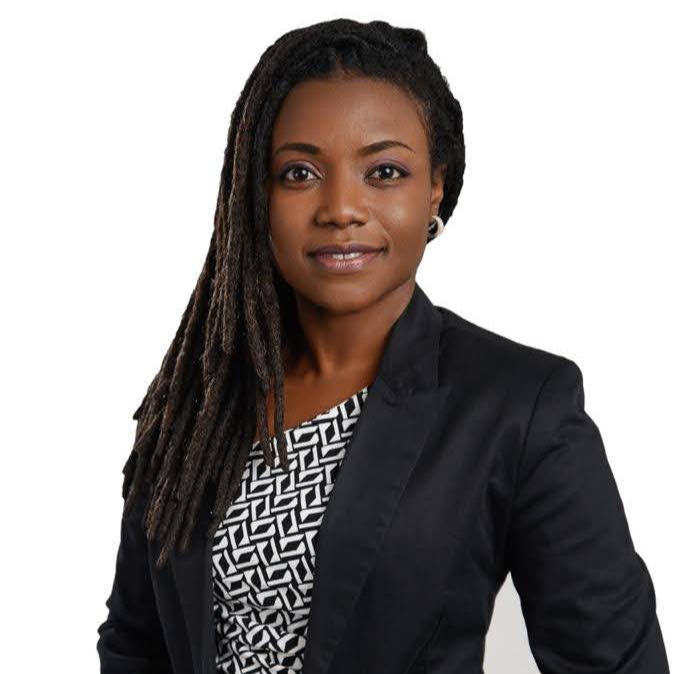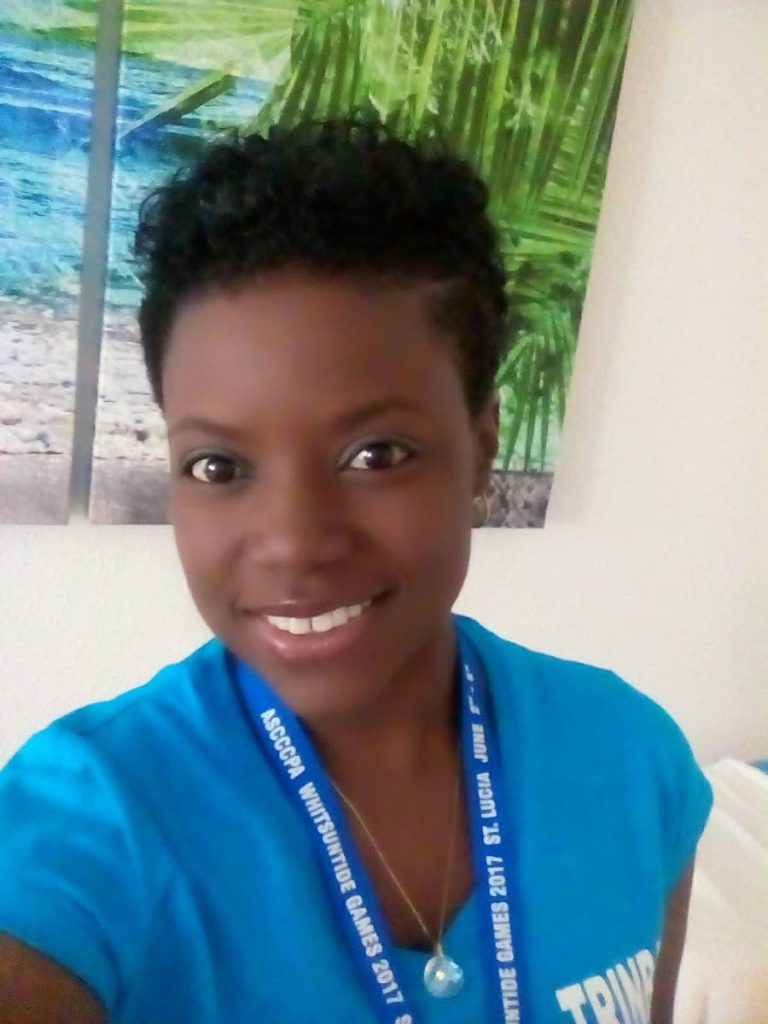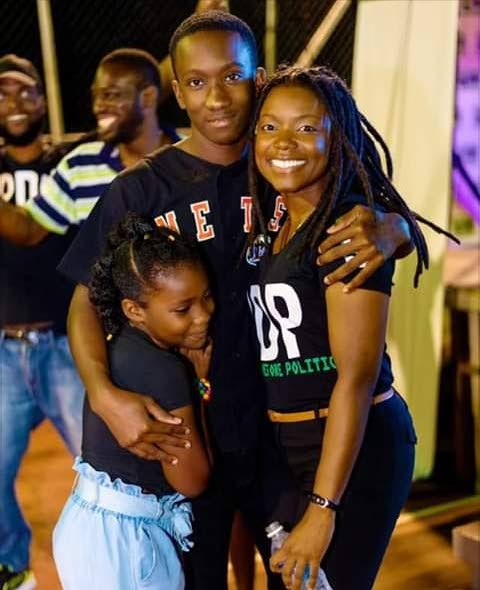Tobago politician: I overcame 16 years of depression

SHORT in stature but with a powerful voice on the political platform, few would guess the silent battle Progressive Democratic Patriots' (PDP) Tashia Grace Burris, 34, fought for 16 years.
Burris, who unsuccessfully contested the Tobago West seat for the general elction, wants people suffering from depression and thoughts of suicide to know, they can overcome. Burris said she was once "stuck in the dark" but confided in a friend who helped her to recover. She urged people to check up on their friends and relatives who they think are strong and doing fine.
Burris' revelations came via a Facebook post on Tuesday, two days before World Suicide Prevention Day.
Recalling what she went through in 2017, Burris posted, “I hit proverbial rock bottom after suffering silently for over 16 years with depression and thoughts of suicide.”
A photo was attached to the post of her in her younger years with her hair cut short.
Burris noted the hairstyle was no fashion statement, but a desperate cry for help.
“It was a silent signal of me being ready to cut the life that God had blessed me with, but that same God was not done with me. He maybe never always gives you what you want, but He always provides what you need.”
She added: “In that time when I lived in a dark hole of my own making, He stretched his hands and said, ‘Come to me my child.’
"I would not have in my wildest dreams thought that three years later He would lead me to this place, to use me as a living testimony of His greatness.”
In an interview with Newsday on Wednesday, the mother of two said she suffered from depression from age 16 to 32.
She recalled that at16, she lost her grandfather, with whom she had a strong relationship.
“I was really, really close to him and I think that is when I could have pinpointed a time when my depression first took root because... I was very, very close to him, the relationship that we had. He was somebody that believed in me and believed in my abilities, he was very proud of me. So when he died the year before I wrote my CSEC exams, I think that was when I fell into the early stages of depression,” she said.
SOCIETAL PRESSURE
One year later, she was pregnant and recounted “the guilt and shame that came with that” from the community.
“Society’s expectations, those of my family, my peer groups, it was a heavy burden to bear at that young age and not being prepared for that. I had nobody to talk to about how I was feeling at the time. So I just kept adding baggage.”
She said as a means of keeping her busy and taking her mind away, she went back to school to do a bachelor's degree, as she used school to distract her from peering eyes and whispers of gossip about her.

"School was the easiest thing that I used to distract me from what was going on internally.”
She said her depression deepened in 2009, when she found out that a friend she had lost contact with had died by suicide. She recalled him being being "the life of the party, very handsome, very bright and very intelligent."
This loss made her more emotionally unstable.
“That was the trigger, so all the baggage that I was collecting over the years from the traumas that I suffered, the various things...his death was that trigger. It was like a spiral and the spiral took place from 2009-2017, which was eight years. So the first eight years was a build-up, building up of my own personal baggage and my own personal tragedies that I suffered and not having outlets to deal with those things. And then when my friend committed suicide, that was when the idea really took route,”
This feeling, she said, was exacerbated the following year, when she had her second child.
“The pregnancy was difficult, my daughter and I almost died and coming out of that traumatic experience, not having anybody to talk to and then the whole post-partum depression that steps in. So on top of me already being depressed, yes, I had that whole post-partum depression, so it was a lot.”
Burris said she plunged her energy into school and began her master's but when that was finished, it was back to square one.
“So, you’re carrying along that baggage and you just don’t know how to put it down until it becomes so heavy that it crushes you. So 2017 was the year that I just actually felt crushed, that I was buried by my baggage. I felt like I was in a dark place. It;s like being in a box you can’t push up, you can’t push out the sides, you can’t push down... you’re stuck and you’re stuck in the dark. It’s the most suffocating feeling in the world.
"And that’s how my daily life was. People see me as a person in front of them, but they don’t know that that person is literally living in a dark box. The stress became so much, so much so that my hair began falling out and my stress was physically manifesting in my health. So all of these things happening at the same thing led me to cutting my hair. But at that time I was already at rock bottom.”
CONFIDING IN A FRIEND
Burris said a phone call gave her strength to fight her problems.
She said a close friend randomly called her one day to see if she was okay.
“He asked me if I was okay and it was at that point I realised that I was no longer able to lie about my state and I felt he was the person I could say, 'No, I'm not okay' to. God always sends you what you need because at that point in time, I needed somebody to take up the task of helping me heal and that was no easy feat.”
She said her friend called her every day for 18 months.
“He was a confidant, he was a mentor, he was a safe space for me that I could just be me. I didn’t have to be the thing that I projected outwards; I could just be me – the broken, messed-up me – and I know that I would not be judged. That person helped me offload my emotional and physical baggage. That person forced me to confront my trauma, forced me to take responsibility for my healing."
She said her friend helped her be accountable and be able to appreciate the gift of life.
She said she knew her healing was completed during the political battle for the 2020 general election and offering herself as a candidate.
“Some of the things I suffered in the election, if I was that old person, it would have been enough to drive me back into depression. As bad as it got, it was like things just rolled off my back. I’m not saying that I didn’t get angry or I didn’t get hurt by some of the things that I saw... I am still human,” she said.
LEARNING TO APPRECIATE LIFE
Burris said even though she is stronger she still has moments of weakness but is able to deal with them better.
“Sometimes I get moments where I can remember things about things that have happened to me, but because you’ve grown, you look at things from a different perspective and you’re able to process better, I am able to live in my moments better, I’m able to appreciate life a whole lot more."
Burris said she often wonders if she could have helped save her friend. She said his memory has made her commit to reaching out to others.
“I would think about what I could do differently to make sure that he doesn’t happen again, so that is why suicide prevention has always been a quest of mine.”
She noted that a lot of people project the lives that they wish they had, seeking external validation. She said this is a dangerous practice which masks real-life issues.
“It’s a brutal world out there and because we’re existing in this brutal world, people don’t have mechanisms to cope. So that’s why when you hear a lot of times when people commit suicide, the first comment is usually , 'Oh my God, I didn’t know that person was depressed, they looked so happy.'
"But that is how mental illness works, that is how people who are depressed operate.”
She noted that people who look strong most often times need the most support.
“They are the ones that need the most help, need to know that there is a place they can go to... to just simply offload, to just simply not have to deal with the judgment.”
She added that even though her emergence in the public sphere was through politics, she sees her role as far larger.

“I’ve always aimed to motivate, inspire and transform people. I am at a place now where I am comfortable telling my story because it's not a sad story, it’s a story of triumph, it’s a story of success, it’s a story of succeeding against all odds, it’s a story of hard work, it’s a story of determination, it’s a story of how God works. Because certainly this experience has made me more bold about speaking about my faith and my journey back to God.”
She added: “I am not responsible for me being here, and every day that I am blessed to open my eyes, it’s not because I did anything, but I believe that there is a God and that God has decided that 'you need one more day to do what I’ve purposed you to do.' When you decide that your life no longer belongs to you, it becomes easy to just give yourself over to what God has for you. You don’t think about the naysayers, you don’t think about what could go wrong, you don’t think about who is against you, you just have your mind singularly focused on fulfilling your mission.
"I would walk in my truth. I am not ashamed of the things that I’ve been through, I am not ashamed of the life that I’ve lived, I’m not ashamed of the mistakes that I’ve made because they’ve also led to lessons that I hold near and dear. I’m not ashamed of my children, I’m not ashamed of how they came about.”
The Division of Health, Wellness and Family Development offers a confidential tele-counselling service to the public. The division said the service is open to anyone feeling overwhelmed because of depression, sadness, anxiety or any other emotion.
The counsellors are Derick (788-3861) and Sharlene (730-7340) in Tobago West and Karelle (730-7390) and Zeina (684-2596) in Tobago East.


Comments
"Tobago politician: I overcame 16 years of depression"